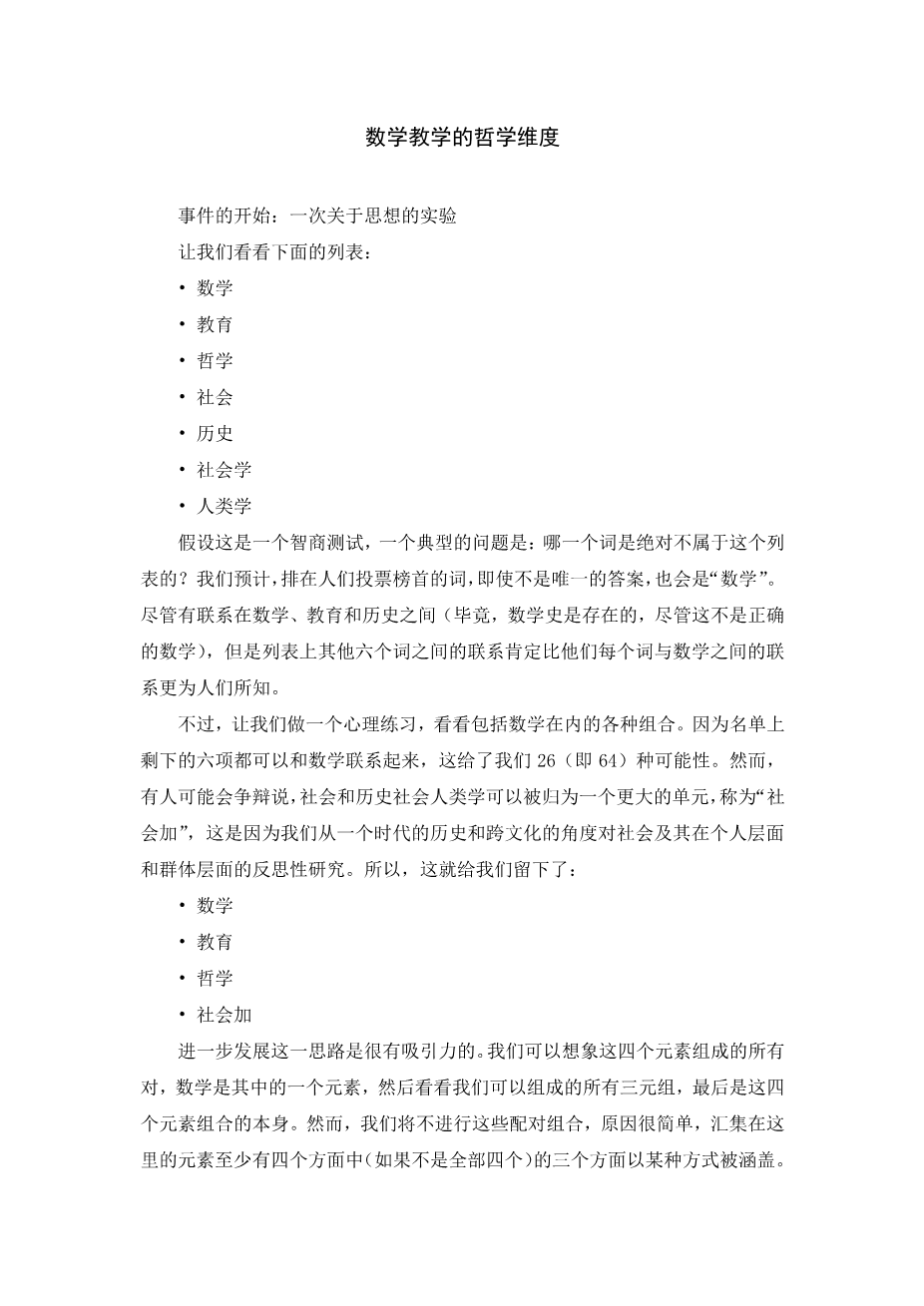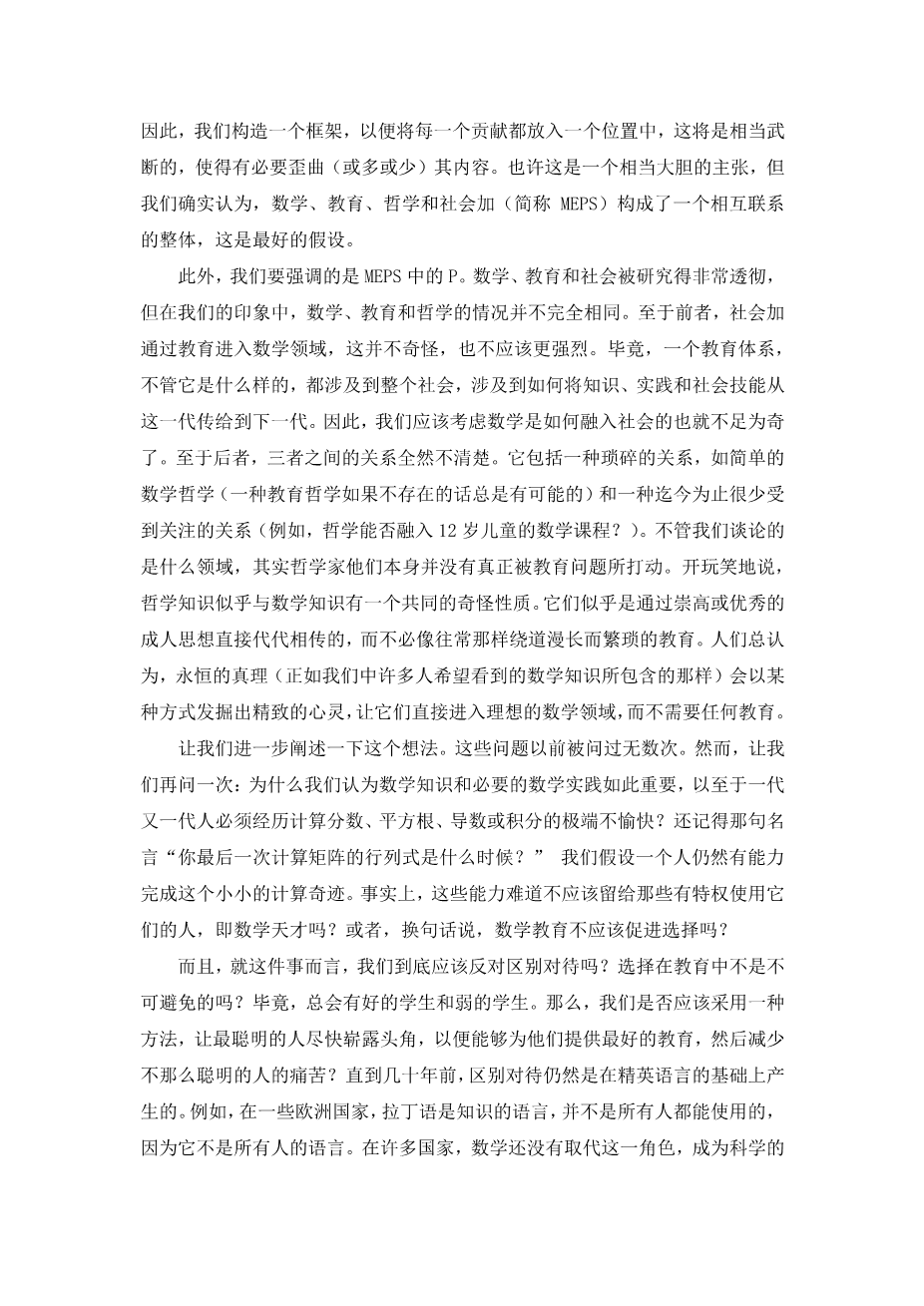Philosophical Dimensions in Mathematics Education
GETTING THINGS STARTED: AN EXPERIMENT OF THOUGHT
Take a look at the following list:
bull;mathematics
bull;education
bull;philosophy
bull; society
bull; history
bull; sociology
bull; anthropology
Imagine that this was an IQ-test and a typical question would be: which item definitely does not belong in this list? We expect that the one word at the top of the list, even if it is not the only answer, will be “mathematics”. Although there is a connection between mathematics and education and history (after all, there exists a history of mathematics, although this is not proper mathematics), the links between the six other members of the list are certainly more recognized than that between each one of them and mathematics.
Let us do a mental exercise, however, and look at all the various combinations that include mathematics. Because each of the remaining six items on the list can be examined in relation to mathematics, this gives us 26 (i.e., 64) possibilities. One might argue, however, that society and history sociology-anthropology can be grouped into a single larger unit, called “society-plus”, in the way that we have society and its reflective study both on the level of individuals and in groups in a temporal-historical and cross cultural perspective. So, that leaves us with:
bull; mathematics
bull; education
bull; philosophy
bull; society-plus
It is tempting to further develop this line of thinking. We could imagine all the pairs that can be made out of these four, with mathematics as one of the elements, then look at all the triplets we can form and finally the quartet itself. We will resist this move, however, for the simple reason that the collection of papers brought together here have the interesting quality that at least three of the four (if not all four) aspects are somehow covered. It would, therefore, be quite arbitrary to invent a framework so each one of the contributions can be inserted into a slot, making it necessary to misrepresent (more or less) its contents. Perhaps it is a rather bold claim, but we do believe that mathematics, education, philosophy, and society-plus, (MEPS for short), form a connected whole and should preferably be approached as such.
In addition, we would like to emphasize the presence of the letter P in MEPS. Mathematics, education and society are well-studied, but we have the impression that the case is not entirely the same for mathematics, education and philosophy. As to the former, it does not—or more strongly, should not—come as a surprise that society-plus enters into mathematics through education. After all, an educational system, whatever particular shape it takes, involves society at large and involves ways to transmit knowledge, practices, and social skills from one generation to the next. It is no small wonder then that we should reflect on how mathematics is imbedded in society. As for the latter, the relationship between the three elements is not at all clear. It ranges from a trivial relationship such as a simple philosophy of mathematics (a philosophy of education is always possible if not already existing) to a relationship that has received little attention up to now (e.g., can philosophy be integrated into a mathematics curriculum for 12-year olds?). Philosophers themselves are not truly impressed by educational problems, regardless of the area we are talking about. Tongue in cheek, it seems that philosophical knowledge has a curious property in common with mathematical knowledge. It seems to be passed on from one generation to the next directly through sublime or fine adult minds without the usual detour of a long, cumbersome education. One is tempted to think that eternal truths (as so many among us wish to see mathematical knowledge consist of) will somehow seek out the fine and exquisite mind and give it direct access to the ideal mathematical realm without requiring any education.
Let us elaborate on this thought a bit further. These questions have been asked a million times before. Nevertheless, let us ask again: Why do we consider mathematical knowledge and possibly mathematical practices so important that generation after generation must undergo the extreme displeasure of calculating fractions, square roots, derivatives, or integrals? Remember the famous quote “When was the last time you had to calculate the determinant of a matrix?” This assumes that one is still capable of performing this small miracle of numeracy. Indeed, should these capabilities not be reserved for those who have a privileged access to them—i.e., the mathematically gifted? Or, in other words, should mathematics education not promote selection?
And, for that matter, should we be fighting segregation at all? Is selection not inevitable in education? After all, there will always be bright pupils and weak pupils. Should we not then apply a method that allows the brightest to surface as quickly as possible, so as to be able to offer them the best education and reduce the suffering of the not so bright? Until a few decades ago, segregation was still produced on the basis of an elite language. For example, in some European countries, Latin was the language of knowledge and was by no means accessible to all because it was not the language of the people. Has mathematics not taken over this role in many countries as a kind of lingua franca for the sciences? The differences between bright pupils and poor pupils will remain, but that does not mean that we must endeavor to generate this segregation as quickly and as sharply as possible. As an alternative, would it not be better to make our ideological-philosophical project known and to indicate that we are advocates—or at least proponents—of an ema
剩余内容已隐藏,支付完成后下载完整资料


英语译文共 7 页,剩余内容已隐藏,支付完成后下载完整资料
资料编号:[410487],资料为PDF文档或Word文档,PDF文档可免费转换为Word


